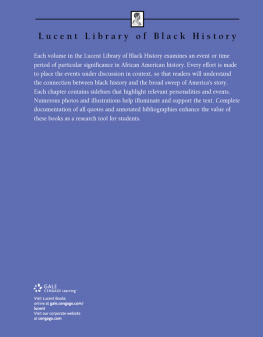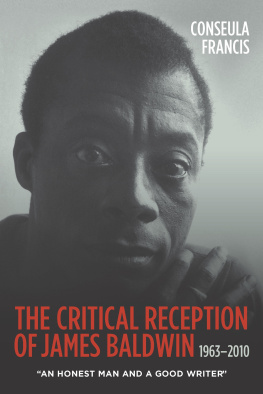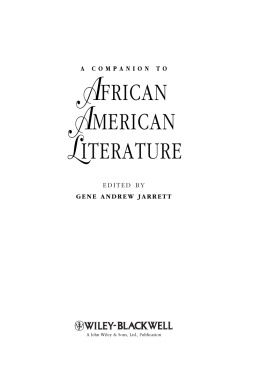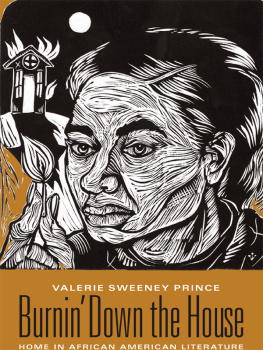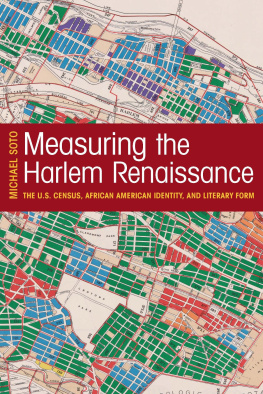Thank you for buying this ebook, published by NYU Press.
Sign up for our e-newsletters to receive information about forthcoming books, special discounts, and more!
Sign Up!
About NYU Press
A publisher of original scholarship since its founding in 1916, New York University Press Produces more than 100 new books each year, with a backlist of 3,000 titles in print. Working across the humanities and social sciences, NYU Press has award-winning lists in sociology, law, cultural and American studies, religion, American history, anthropology, politics, criminology, media and communication, literary studies, and psychology.
African American Literature beyond Race
African American Literature
beyond Race
An Alternative Reader
EDITED BY
Gene Andrew Jarrett

NEW YORK UNIVERSITY PRESS
New York and London
www.nyupress.edu
2006 by New York University
All rights reserved
Library of Congress Cataloging-in-Publication Data
African American literature beyond race : an alternative reader /
edited by Gene Andrew Jarrett.
p. cm.
Includes bibliographical references and index.
ISBN-13: 978-0-8147-4287-7 (acid-free paper)
ISBN-10: 0-8147-4287-4 (acid-free paper)
ISBN-13: 978-0-8147-4288-4 (pbk. : acid-free paper)
ISBN-10: 0-8147-4288-2 (pbk. : acid-free paper)
1. American fictionAfrican American authors.
2. AfricanAmericansFiction. I. Jarrett, Gene Andrew, 1975
PS647.A35A346 2005
813.0080896073dc22 2005031091
New York University Press books are printed on acid-free paper,
and their binding materials are chosen for strength and durability.
Manufactured in the United States of America
c 10 9 8 7 6 5 4 3 2 1
p 10 9 8 7 6 5 4 3 2 1
In Memory of
Grandmother
Sarah Jarrett
March 6, 1920-April 3, 2005
Contents
Gene Andrew Jarrett
Introduction: Werner Sollors
Introduction: Carla L. Peterson
Introduction: Gene Andrew Jarrett
Introduction: George B. Hutchinson
Introduction: Matthew Guterl
Introduction: Amritjit Singh
Introduction: Gene Andrew Jarrett
Introduction: Hazel Arnett Ervin
Introduction: Hazel V. Carby
Introduction: John Charles
Introduction: Gerald Early
Introduction: Mae G. Henderson
Introduction: Jeffrey Allen Tucker
Introduction: Gene Andrew Jarrett
Introduction: Jeffrey Allen Tucker
Bracketed ([ ]) chapter titles are editorially provided to indicate a central theme; otherwise, chapter titles belong to the storys original printed version. [Editor.]
Acknowledgments
The production of this anthology would have been impossible without the support of several colleagues, friends, and family members.
First I must specifically thank the scholars who agreed to contribute one or more headnotes for the primary texts. Werner Sollors approached me unexpectedlybut nonetheless at the perfect time!about the importance of including Frank J. Webb. At an early stage of the project, Carla Peterson and I talked regularly in passing, during office hours, and over lunches at the University of Maryland about the idea of the anthology. She offered useful advice at times when the project seemed dead in the water. George Hutchinson first told me about the magazine stories of Nella Larsen, and he volunteered to take valuable time away from writing his biography of her in order to contribute to the anthology. Matthew Guterl and I played phone and e-mail tag over one summer as we came to mutual agreement about which of Jean Toomers post-Cane stories would best fit the book.
A substantial portion of what I know today about methodological critique first came when, as an exchange graduate student at Yale University, I took Hazel V. Carbys course about theorizing racial formation in the United States. It thrills me to know that my career came full circle and that I had the opportunity to work with Hazel directly on Zora Neale Hurston. The anthology attracted the interest of Amritjit Singh early and enabled us to work together for the first time, during which his vast knowledge of the Harlem Renaissance and Wallace Thurman deepened the project in ways that I cannot begin to articulate here. John Charles kindly offered to write about more than just Chester B. Himes, and our interaction during this project helped set the basis for a long-term intellectual relationship in which we will try to edit the first collection of essays on Frank Yerby. Hazel Arnett Ervin agreed to contribute a headnote on Ann Petry at a very late stage in the game and at a hectic moment for both of us. Gerald Early expressed his support for the project, although we did not have the chance to talk at length about his remarkable essay on Richard Wrights Savage Holiday. Mae G. Henderson embraced the idea of the anthology from the very beginning, although my first e-mail to her must have come out of the blue and, admittedly, probably without the best contextualization.
Finally, Jeffrey Allen Tucker and I talked for hours day and night, on more than one occasion, about the implications of the project for African American literary studies. He also put me in contact with Samuel R. Delany, with whom I had a long and fruitful conversation about his work and about the goal of the anthology. Without Jeffrey and the other contributors, who represent an array of academic generations, professional accomplishments, and scholarly backgrounds, this anthology could not have achieved its goal of exemplifying the extent and diversity of intellectual interest in how and why African Americans have considered writing literature beyond race.
I must also express my gratitude to NYU Press, especially Eric Zinner and Emily Park. Eric was open-minded, thoughtful, and a guiding editorial force throughout the process, from the moment I submitted a proposal to the moment I put the final touches on the manuscript. Emily served as a wonderful and necessary interlocutor when things on my side began to get unwieldy and complex and I needed immediate advice on how to complete certain tasks.
I thank all the literary agencies and estates representing the primary authors of this book. In expeditious ways they responded to my inquiries about copyright law, permissions paperwork, and discounts on fees, even while I was still learning the ropes about permissions requests and negotiations. The staff at the Copyright Office of the Library of Congress and the Beinecke Library at Yale University assisted me as I was trying to locate the copyright information for some of the more obscure primary texts.
The University of Maryland, College Park, awarded me a Graduate Research Board grant to cover part of the fees associated with securing the copyright of several of the primary texts. Certain faculty members there deserve mention for their support. Aside from Carla Peterson, mentioned above, I thank Mary Helen Washington, Charles Caramello, Robert Levine, Sangeeta Ray, Kandice Chuh, Zita Nunes, Ralph Bauer, Sheila Jelen, and Matthew Kirschenbaum, as well as Betty Fern, Isabella Moulton, Irene Sanchez, and Alka Soni in the main English department office. Scholars at other institutions helped me in direct or indirect ways, especially Henry Louis Gates Jr., Shelley Fisher Fishkin, Richard Yarborough, Nancy Armstrong, Leonard Tennenhouse, Alan Wald, Xiomara Santamarina, Madhu Dubey, Kenneth W. Warren, Yogita Goyal, Frank Christianson, and Rowan Ricardo Phillips.
Finally, I must thank my familythe Jarrett and Boynton familiesfor providing the spiritual strength to complete this project, to overcome moments when my courage was shaken, my obstacles seemingly too many, and my energy low. Above all, I must thank my wife, Rene, for believing in my vision even before I could articulate it clearly and confidently, and for advising me to milk original ideas until the very end. The new wonder of my life, my daughter Nyla, thankfully cared little about this anthology and cared more that I was okay. And I must thank my grandmother, Sarah Jarrett, who unfortunately passed away in April 2005. Her life and legacy constantly remind me to keep everyone and everything in proper perspective.
Next page

